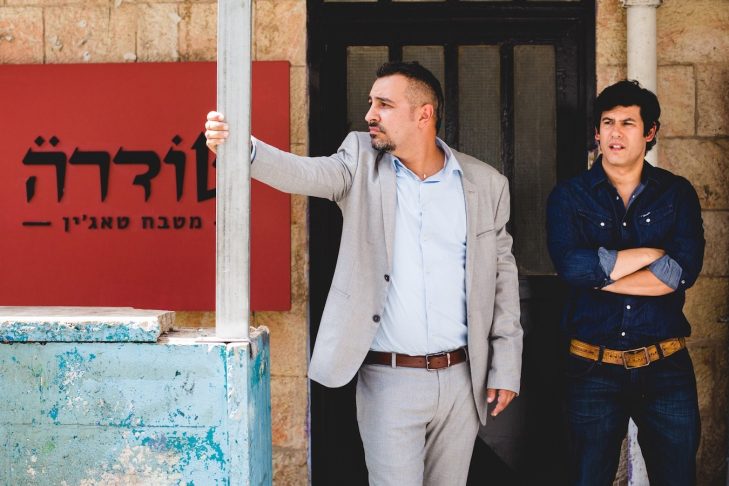In the past couple of years Netflix has become a wonderful resource for Israeli films and television shows. “Maktub,” the latest example of Netflix’s powers of engagement, was a box office success in Israel, and had it not been offered on the popular streaming service would have had only moderate exposure on the Jewish film festival circuit. Instead, this comedic take on the mobster movie genre is available in millions of homes. The “Goodfellas” here are successful Israeli television stars Guy Amir and Hanan Savyon.
Amir and Savyon co-wrote the screenplay, which casts them as small-time gangsters Steve and Chuma. Their job is to collect protection money from various Jerusalem restaurants for their crime boss, Kalassy, played by Itzik Cohen. Audiences may remember Cohen as one of the spies in another Israeli Netflix hit, “Fauda.”
Unlike other gangster movies, “Maktub” isn’t especially violent; there are only a couple of intense scenes. In one of those scenes, a new chef tells Steve and Chuma he will no longer pay them their blood money. The pair, who also fancy themselves food critics, quickly devolve into the thugs they are and beat him. It’s all in a day’s work, and afterward the two are still hungry. They go to another Jerusalem restaurant for lunch and leave their one-eyed Chechen strongman outside with a briefcase full of loot.
When Steve and Chuma slip off to the bathroom a bomb goes off, killing everyone in the restaurant, as well as the Chechen strongman waiting outside. Chuma, the more superstitious of the two, takes the bombing as a sign to leave their line of work. In fact, the word “maktub” means “fate” in Arabic. In the meantime, they recover the briefcase full of shekels. The duo decides to tell Kalassy that the Chechen survived the bombing and took his cash.
Steve wants to take his share of the money and immigrate to the United States to buy a food truck, but Chuma insists they go to the Western Wall to give thanks first. While there, they pull out a note from a man who asks God to help him work less hours and earn more money to save his marriage. Chuma decides that in order to repay God for saving their lives, they must help the man. They track him down and persuade his boss—by dangling him out a window several stories high—to give the man a raise.
Chuma convinces Steve it is their fate to be guardian angels, and they return to the Wall. To acquire notes from the women’s section, the two buddies dress as women. It’s a funny bit that doesn’t go over the line into crassness. Their next good deed is for a single mother, a Russian émigré who wants to throw her son a bar mitzvah. Chuma insists on bankrolling the bar mitzvah with their ill-gotten money. The next note they retrieve is from a 40-year-old woman who has been trying to have a baby for years.
At the same time, Kalassy and his partner, Tzafuf, travel across the world to Chechnya to recoup the missing money. The two men also have a great “buddy” relationship that provides the movie with more sophisticated moments of black humor. Eventually, Kalassy figures out that the Chechen died at the restaurant and goes after Steve and Chuma. There is also a subplot involving Steve’s child, Avisar, whom Steve is sure is not his. During the course of the movie, Chuma becomes romantically interested in Steve’s ex-wife, Lizo, and attached to Avisar.
By the end, the storylines in this funny movie somehow converge. It helps that Amir and Savyon have wonderful chemistry together. They also have a light, comedic touch; they don’t allow the physical comedy to be reduced to mere slapstick, allowing them to get away with the couple of scenes of more graphic violence without bogging down the film. With “Maktub,” Amir and Savyon have made an entertaining, clever, Israeli version of “Goodfellas.”



